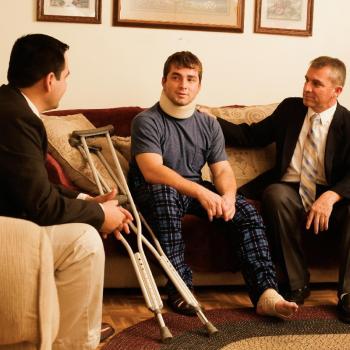
Young men in the Mormon faith are almost guaranteed to be automatically enrolled with the Boy Scouts of America. I spent the majority of my teenage life attending BSA camp-outs, rafting down rivers, and camping out in the middle of no-man’s land. The BSA has always stood for some perceived transition into manhood by many members—learning how to start a fire, properly use an ax, and how to tie one-thousand-and-one-knots.
However, last month the BSA announced a policy change that would allow gay adults to serve as leaders, with a religious exemption.
The Church’s response, simplified, was that the policy change allowing gay leaders was “deeply troubling.” Furthermore, the church is reevaluating its relationship with the Boy Scouts of America, ending the 100-year long program for young Mormon men. A study conducted by Utah Policy found “63 percent of “very active” church members think the church should probably or definitely sever ties with BSA. In contrast, only 23 percent of similar members want the church to remain in the BSA.” Analyzing these statistics, it is easy to dismiss the majority of members as homophobic, believing the policy change to be fundamentally against current church teachings.
As a young man struggling with understanding my sexuality, I never felt quite comfortable in the hyper-masculine environment found in the BSA. Yet, when I heard about the recent policy changes over the past year—allowing gay scouts and leaders—I couldn’t help but be excited for the future of the BSA. Obviously, I fully support greater inclusion within the scouting program.
Through my own biases, I struggle to understand the possible reasoning behind this call to action by members of the LDS Church. Any claim centering on doctrinal reasoning are ultimately groundless. There are religious exemptions which would allow Church scouting troops to have control over leadership. The fear of a gay man sleeping in a tent near a child’s separate tent (as is outlined by BSA policy) is frankly extremely ignorant.
The simple examination paints a picture of bigotry, reminiscent of the false belief that gay men are pedophiles; however, there also seems to be a lurking variable in the equation. Though the poll suggests that the majority of members, at least in Utah, wish to cut ties with the BSA, I question the motive behind yearning to sever such an established relationship. Though there is no doubt in my mind that some members wish to cut ties solely out of homophobia, there are also many members who would rather have more emphasis placed upon the Duty to God program, or a church owned and operated scouting type program. The BSA is a separate organization that is not owned by the church, and as such the BSA board is allowed to do as they please. This is especially true as queer rights groups and inclusive corporations have placed pressure upon the board to change its homophobic policy.
Delving deeper, I see the issues that plague the relationship between The Church and the BSA, regardless of the policy change(s). Rising costs of the scouting program has had a negative economic impact on many wards, especially as funding for youth programs have dwindled over the past decade. Many expenses that were once paid for through ward funds have now been passed onto scouting families that have their children in the BSA.
If Church leadership decides to stop supporting the BSA, I doubt the “gay issue” is the sole contributing factor, though it doesn’t surprise me that this would be the scapegoat. There are many positive outcomes from activity in Boy Scouts, yet the decline in enthusiasm for an expensive program that does not have a direct relationship on the overall spirituality of young LDS men is more likely a motivation. The fact that the BSA will now allow gay leaders is the straw that broke the camel’s back, but not necessarily the main motivation behind a possible divorce between the two organizations. The Church continues to have a tense relationship with LGBTQ+ rights groups, and using queer rights as a scapegoat for other issues with the BSA is despicable. Regardless of whether my analysis is true or not, The Church is still completely disregarding the queer community, seeing queer individuals as second-class citizens and members of the church. It further proves that the very minimal work The Church has done towards queer inclusion is a media stunt to create a queer-friendly façade.
Note: On August 26th the LDS church announced it will continue its relationship with the BSA, but will also continue to evaluate options. You can read more about this announcement here. Though I am surprised and pleased by this decision, I believe the poll conducted by Utah Policy still casts some questions about the relationship between the LDS Church and the BSA.












